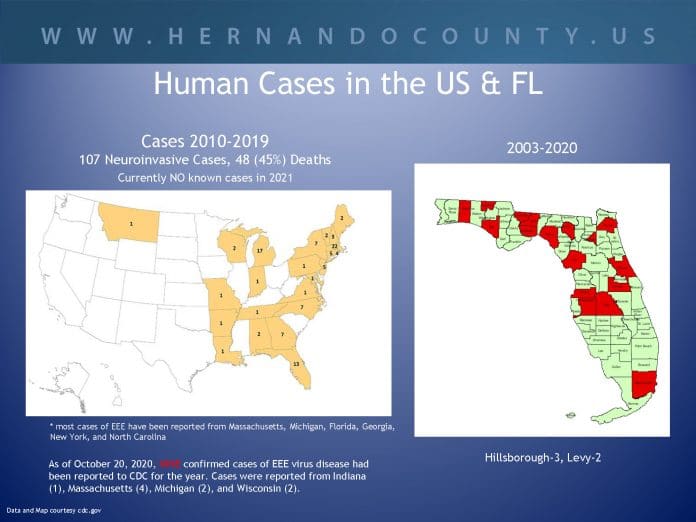Sandra Fisher-Grainger, Mosquito Control Director, gave a presentation to Hernando County’s Board of County Commissioners on July 13, 2021, regarding public safety awareness concerning Eastern Equine Encephalitis Virus. Fisher-Grainger has had spray trucks running since Thursday morning July 8 for mosquito control as they have had three sentinel chickens come up positive in June. Fortunately, she reported on July 13, they have had no positive chickens since then. Chickens are used in detecting the presence of the virus as EEE is primarily transmitted from mosquitoes to birds.
What is EEE? It is a rare mosquito-borne disease of the brain that causes encephalitis. The disease can manifest itself as a systemic febrile illness or as a neurologic/encephalitic disease. It is primarily found in the eastern and Gulf Coast states. There is a 30% mortality rate in humans, yet there is a 90% fatality rate for unvaccinated horses. Those who do recover from the severe cases have lasting physical or mental disabilities.
The EEE virus cycles between mosquitoes and birds. The Culiseta melanura mosquito, which primarily feeds on birds, is responsible for spreading the virus among birds. The virus then multiplies in the birds’ bloodstream. People and other animals, like horses, become infected with the virus when mosquito species that feed on many types of animals, feed on infected birds and then bite people. Horses and people are considered dead-end hosts because unlike birds, they don’t develop high levels of the virus in their bloodstream and cannot pass the virus onto other biting mosquitoes. Fisher Grainger explained that birds migrating from northern states may be carrying the virus here.
There are no cases of the virus found in humans in the United States as of this year. From 2010-2019, there were 107 Neuroinvasive Cases, 48 Deaths (45%) . Most cases of EEE have been reported from Massachusetts, Michigan, Florida, Georgia, New York, and North Carolina. As of October 20, 2020, nine confirmed cases of EEE virus disease had been reported to CDC for the year. Cases were reported from Indiana (1), Massachusetts (4), Michigan (2), and Wisconsin (2).
The Culiseta melanura mosquito particularly likes acid swamps such as cedar swamps. Of the three positive chicken cases, one was found at Knuckey Rd at Tayco Dr. near the Chassahowitzka Preserve where the Culiseta Melanura mosquitoes are always present. The other two chickens were found at Earnest Lee Rd in Spring Lake. This is interesting because there are no acid swamps in that area. Fisher-Grainger believes that since there are a lot of freshwater wetlands out there, it is an attractive area for birds. What can happen is those mosquitoes that feed on many animals will feed on a bird that’s been exposed then it will feed on the chickens nearby. She said that chickens are also a dead-end host, so the virus won’t spread beyond them.
Weekly the Department of Health puts out an arbovirus surveillance report. Beginning July 3 and ending July 10, there were three additional horse cases as well and four more positive chicken cases state-wide on the northern side of Florida. Mosquito Control is keeping a close eye on EEE, because it’s a very serious disease.
How should you protect yourself against EEE?
– Use repellent every time you go outside
- Those can include the active ingredients DEET, Picaridin, Oil of Lemon Eucalyptus, etc.
- Active ingredient % indicates protection time
- Follow the label directions, especially for children
- These repellents also work against ticks as well
– Dress in light, loose and long clothing
– Avoid outdoors before dawn, after dusk
– Dump/drain containers, fill low-lying areas on property with rocks or pebbles as it prevents the mosquitos from completing their life cycle.

